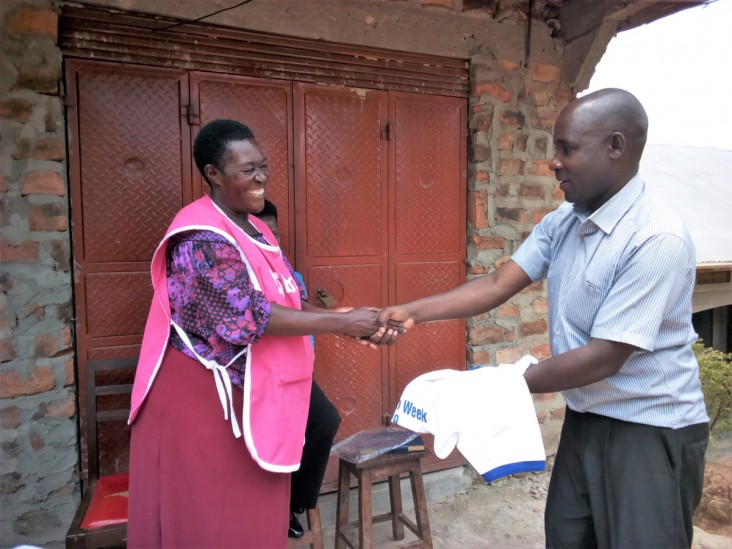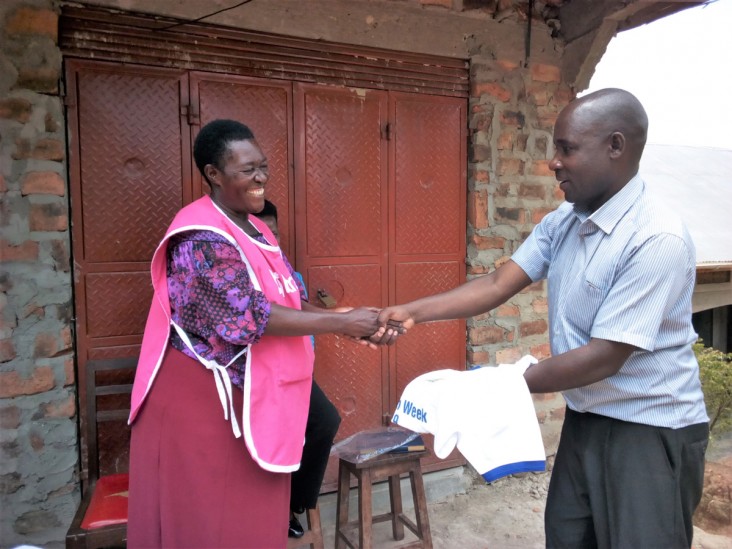Speeches Shim

In Uganda, USAID leveraged over $507,000 USD to improve access to water, sanitation, and hygiene services through partnerships with the private sector and the Rotary Clubs of Uganda in just two years.
Nationally, only 18% of Ugandan households have access to basic sanitation.1 Diarrheal illness from lack of access to safe sanitation is one of the main causes of death for children under five.2 Mary Nalugoda is a community health worker who lives in Towa, a small village in Uganda with just 143 households. As a community health worker, Mary has seen many sick children with diarrhea in her community and became passionate about learning how to prevent cases of diarrhea from happening in the first place.
USAID works to expand access to basic sanitation services in 21 districts in Uganda. In partnership with the private sector, USAID supports the development of consumer-focused and locally manufactured sanitation products, as well as the training and support of frontline health workers, like Mary, to provide basic health care services and direct product sales in communities. USAID also partners with Rotary International, a global non-profit organization, to facilitate menstrual hygiene education in schools and assess hygiene practices in health facilities.
Mary participated in one of the USAID-supported training programs, where she was taught how to provide counseling on proper handwashing and the benefits of using latrines. She was also empowered with the knowledge and skills necessary to sell locally manufactured safe toilets, or SaTo Pans, in rural communities. After this training, Mary began selling SaTo products door-to-door and working with local masons to correctly install the toilets. She quickly began to realize the benefits both for her community and for herself as an entrepreneur.
“Diarrhea cases have reduced tremendously in this village,” Mary observes. “I know because as a community health provider, in addition to SaTo toilets, I also sell medicine, but business for medicine of sanitation-related diseases has been slow, which is a sign that people are healthy.”
Driving Local Innovation and Impact
As a result of the USAID-supported training, Mary is now an advocate for safe sanitation and a community leader for WASH practices. Mary has sold over 143 toilets, reaching every household in her community with safe sanitation and built a business to support herself in the process.
In the past year, through partnerships with the private sector and the Rotary Clubs of Uganda, USAID has leveraged more than $507,000 USD to improve access to water, sanitation, and hygiene services in schools, health facilities, and communities. By leveraging local resources in Uganda, USAID is driving innovative solutions to change sanitation and hygiene behaviors and prevent disease and is supporting over 400 community health workers like Mary to sell SaTo products across Uganda. By fostering new and innovative partnerships and expanding existing collaborations, USAID is helping countries like Uganda develop innovative solutions to improve the health of women, children, and families, in turn strengthening the health system and helping countries progress on their Journey to Self-Reliance.

Download the PDF version of this story. [PDF, 1.3MB]
1 https://washdata.org/data/household#!/uga
2 https://dhsprogram.com/pubs/pdf/FR333/FR333.pdf [PDF, 9MB]

Comment
Make a general inquiry or suggest an improvement.